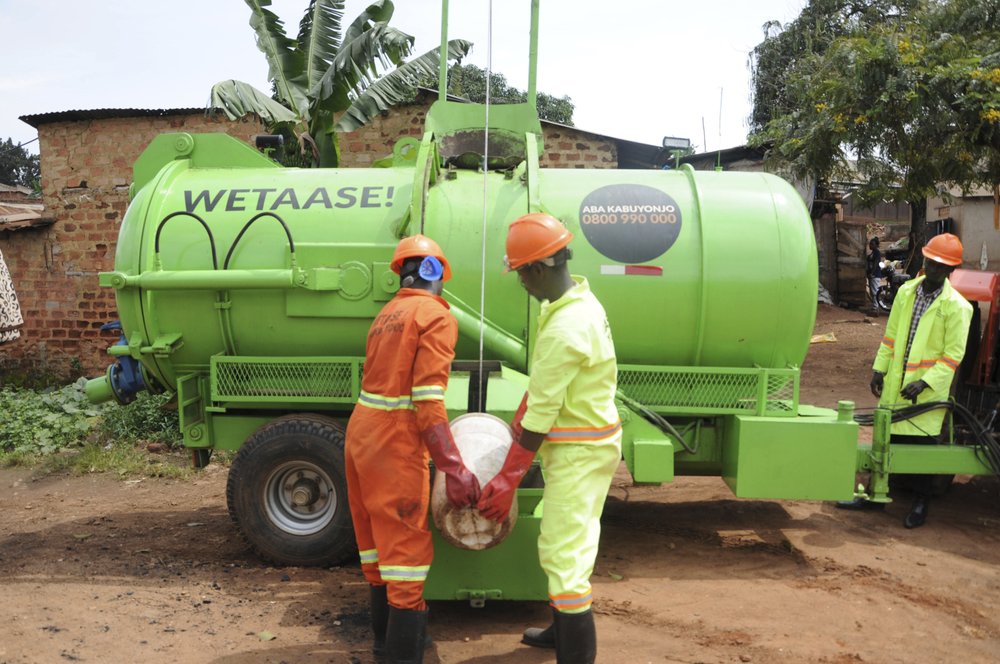MAKINDYE-LUKULI, Uganda — The darkening clouds are ominous for many in this urban neighborhood, promising rushing rainwaters stinking of human waste from overflowing septic tanks.
As Africa faces a population boom unmatched anywhere in the world, millions of people are moving to fast-growing cities while decades-old public facilities crumble under the pressure.
Sewage is a scourge for residents of this community on the outskirts of Uganda’s capital, Kampala. There are no public toilets for some 1,200 people. Mud tinged with feces washes into homes during heavy rains.
The sanitation crisis echoes that of cities across the developing world. Some 2.5 billion people, most of them in Africa or Asia, lack access to an adequate toilet, United Nations figures show. Governments are increasingly depending on private businesses and philanthropic groups to help manage human waste in cities that were never planned to handle so many people.
One of the fastest-growing cities in the world, Kampala is home to at least 1.5 million people but authorities say over 3 million pass through daily, usually for work. Yet there are fewer than 800 pay toilets and only 14 free ones, many of them dilapidated with walls often smeared with feces.
Many people rush to malls to relieve themselves. Even in the buildings of government agencies the toilets are often kept under lock and key, apparently to discourage intruders.
Kampala’s urban sewer system covers less than 10 percent of the population, authorities say. When pit latrines and septic tanks are not safely built, they pose a serious health risk. They leak fecal waste that contaminates swamps and Lake Victoria, the city’s main water source, especially during the rainy season.
“Less than 50 percent of the fecal sludge generated in Kampala safely reaches a waste treatment plant,” said Angelo Kwitonda, a sewage engineer with the government. “The rest of the volume is kept in our homes.”
Outbreaks of cholera and other water-borne diseases are common.
Poor sanitation costs Uganda $177 million annually in economic losses linked to disease treatment and lost productivity as people search for places to relieve themselves, according to a World Bank report in 2012. Some 650,000 toilets need to be built to avoid open defecation, it said.
It could get worse. Africa’s urban areas contain 472 million people, a number that is expected to double over the next 25 years, according to a 2017 World Bank report .
“The problem of sanitation is very big, so we have had to prioritize,” said Najib Bateganya, a Kampala sanitation official who said authorities have been focusing first on improving sanitation in public schools.
“The next model is going to focus on entrepreneurship, toilets as business,” he said.
Authorities in Kampala have not constructed a single public toilet for years, though a plan exists to set up 200 toilets by 2025 with the support of donors such as the German development agency GIZ.
Private companies have been trying out solutions in poor, crowded neighborhoods such as Makindye-Lukuli, where trash piles up around tin-roofed homes.
A sanitation program backed by the Bill and Melinda Gates Foundation focuses on emptying septic tanks in households not easily reached by vacuum trucks, which are privately operated.
Using a tool resembling a giant syringe, men in safety suits pump fecal waste into drums that are emptied into a movable tank, for a tiny fraction of the roughly $50 that would be paid to a vacuum truck operator.
“Whenever it rains always the unclean places suffer from cholera, so we must be vigilant,” said village chairman Stephen Semanda, who encourages residents to report on each other under the new system. Residents receive a meter-long stick that they dip into their toilets.
If “it comes out with anything on it, it means the toilet is now harmful to you,” he said. That’s when a so-called “gulper” should be called in to pump.
Nearly two dozen groups operating in Kampala now provide the gulping services, said Winnie Kemirembe of the Gulpers Association of Uganda.
“It is a good business,” she said after supervising the pumping of raw sewage from one stinking latrine.
Similar innovations are being tried out elsewhere in Africa. In the West African nation of Burkina Faso, where open defecation is said to be the norm in many villages, the group WaterAid promotes a fundraising initiative under which prominent residents commit their own money toward building public toilets.
In Senegal, whose capital Dakar is vulnerable to flooding, aid groups have helped to construct toilets that break down waste onsite, turning it into compost and a source of renewable energy, said Yacine Djibo of SpeakUpAfrica, a Senegal-based group whose work includes advocacy for improved sanitation across the continent.
Other sanitation entrepreneurs in Africa are developing toilet models that might charge as little as 5 cents for an entire day’s use, an improvement on the traditional practice of charging users every time they walk in.
Joel Ssimbwa, a Ugandan businessman who operates private toilets in Kampala, said he is working with community leaders in heavily populated areas to launch a franchise that would allow an entire family to “pay once for a day, and for multiple uses.”
Yet even that arrangement still may be unaffordable for the city’s poorest residents, said Semanda, the village chief.
On a recent afternoon, he pointed to a neighboring hill where he said a cheap public toilet remained too expensive for some who linger outside, hoping for free entry.
“The cheaper, the better,” he said.
(AP)











